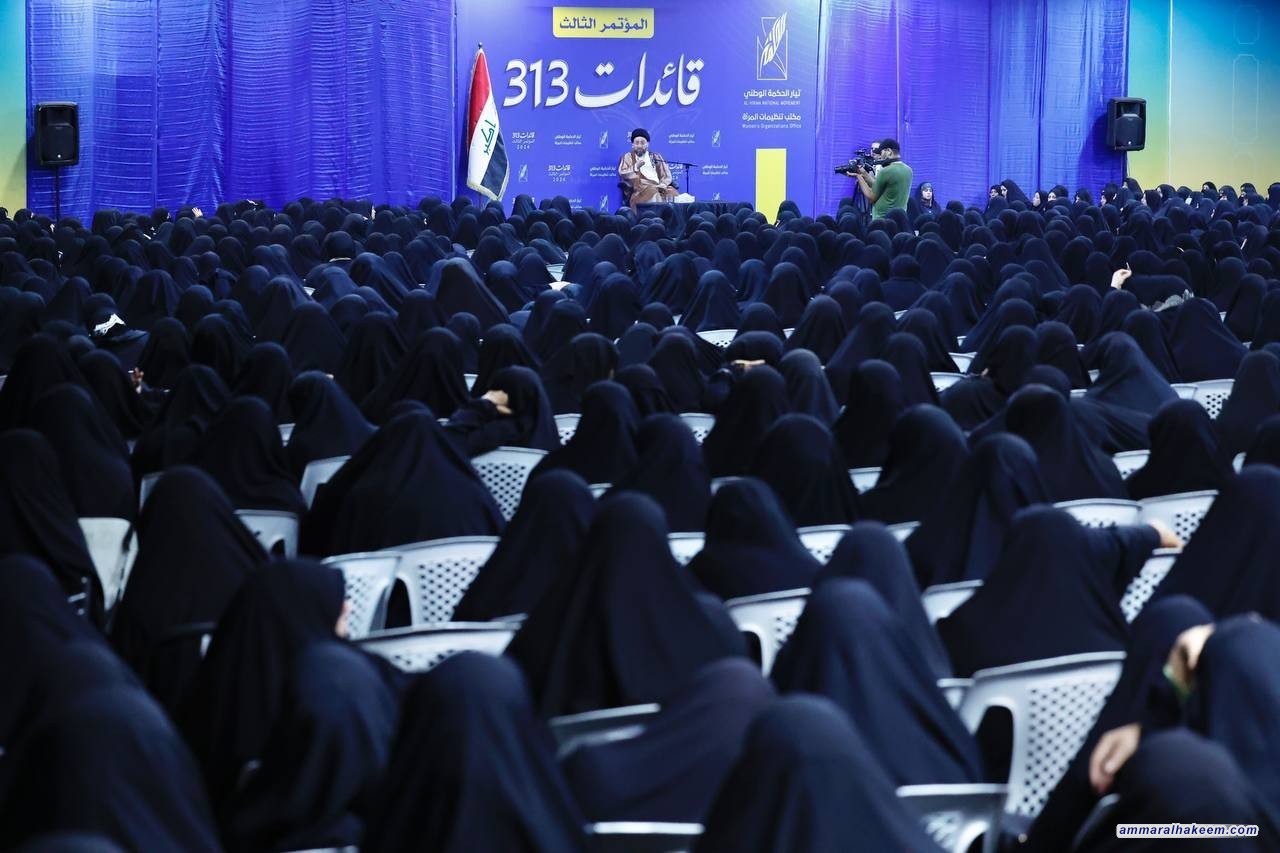cSayyid Al-Hakeem Urges Husseini Orators to Educate Society About Surrounding Challenges
Sayyid Ammar Al-Hakeem, Head of Al-Hikma National Movement, addressed a large gathering of Husseini orators during their third conference in Najaf, which was held in anticipation of the holy month of Muharram and their missionary duties. His Eminence emphasized that the days of Ghadir and Muharram reaffirm the message of guardianship and governance, linking Ghadir closely with the Islamic message as outlined in the Quran, marking the completion of the faith and the despair of disbelievers from harming Islam.
H.E. stated that the message of Muharram is one of sacrifice for guardianship and the establishment of righteous governance. H.E. highlighted the supreme sacrifices made by Ahl Al-Bayt (peace be upon them) and the companions of Al-Hussein (peace be upon him) on the Day of Ashura, stressing that Al-Hussein's sacrifice was a life-giving message based on truth and justice. The cause of Al-Hussein (peace be upon him) is central, and his visitation is recommended at all times.
H.E. emphasized that Husayn is both an example and sadness and that we must embrace both aspects. H.E. noted that Husseini gatherings have fostered generations of loyalty, sacrifice, and bravery. However, H.E. warned against invoking tears through stories that are unbefitting Al-Hussein (peace be upon him) and his cause. It is incorrect to wrong Al-Hussein with unrealistic stories to draw people’s tears under the pretext of serving and reminding the people of the unjust treatment, urging reliance on credible narrations and the works of great scholars and credible narrations.
H.E. also stated that Al-Husseini's Cause is a reality we live in every day, not only a history that we read, and the practical use of it must be achieved. This requires connecting the cause to daily life, as it’s a cause of truth and falsehood for all times and places. Every era has its Hussein who follows the path of Hussein, and those who are Yazids.
H.E. also stressed the importance of unity inspired by the Husayni cause. The Husseini Cause unites the nation. H.E. called for the unity of speech that softens and mends the hearts. The logic of Al-Hussein (pbuh) is of containment and accepting one another. H.E. noted that the messages of Ghadir, Ashura, and the anticipation of the Mahdi are interconnected, and Waiting for Imam Mahdi (pbuh).
H.E. stressed the Mahdawian culture in Husseini platforms to connect people with their Imam and to address social challenges such as drug abuse and divorce, viewing it as a podium for reform, guidance, and family support. H.E. urged solidarity with the Palestinian cause, noting that the Gaza crisis has challenged the narrative of victimhood promoted by the occupying entity, highlighting Palestine's victory through dignity and international sympathy. Highlighting the return of the Palestinian cause as a central cause in the world and the region.
H.E. also advocated for spreading positivity, optimism, and hope, discussing positive indicators like urban development, economic conditions, and Iraq's regional and international openness. H.E. encouraged people to support their political system, supreme religious authority, and political leadership, and to logically compare Iraq's past and present in terms of services and economic conditions.


/9/3/photo_2025-12-10_09-25-13.jpg)
/9/2/photo_2025-12-10_09-17-58.jpg)
/9/1/photo_2025-12-10_09-11-13.jpg)
/8/3/photo_2025-12-09_10-42-49.jpg)
/8/2/photo_2025-12-09_10-37-31.jpg)
/8/1/photo_2025-12-09_09-54-18.jpg)
/7/1/photo_2025-12-08_09-38-41.jpg)
/5/1/photo_2025-12-07_09-25-35.jpg)
/3/2/photo_2025-12-04_11-05-55.jpg)
/3/1/photo_2025-12-03_11-49-28.jpg)